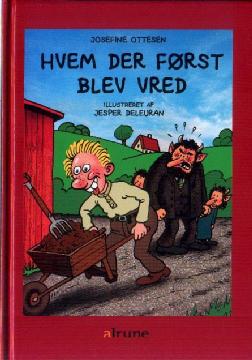An exciting folk-tale about the brothers Per, Poul and Simple-Hans who, one after the other, get work at the troll's large farm. It's difficult when agreements have to be kept.
Who will get angry first?

|
Alrune, 2003 |
Extract from The One Who Got Angry First Author's comments |
|
An exciting folk-tale about the brothers Per, Poul and Simple-Hans who, one after the other, get work at the troll's large farm. It's difficult when agreements have to be kept. |
|
|
|
|
Back to the top
Extract from The One Who Got Angry First :
(Freely adapted from Svend Grundtvig's rendition of an old Danish folk-tale)
Once upon a time, there was a poor man and his wife. They had three sons. The oldest was called Per and the next was called Poul. They were both wise and strong. But the youngest, Hans, was not so bright. So he was known as Simple-Hans.
When they grew up, they had to go out to work. Per was the first to go and look for a job. He took a good parcel of food with him and left. He walked far and wide before he met anyone. It was a man in a grand carriage. He looked rich.
"Where are you off to?" he asked Per.
"I'm looking for work."
"Can you work hard?"
Per said he was sure that he could.
"How much does it pay?" Per wanted to know.
"A big bag of silver. But you have to stay until the cuckoo comes."
That was a really good wage, thought Per.
"If you're going to work for me, you have to be sharp. Every morning you must get up when the cock crows. And you must do as I say."
Per really wanted the job. He would certainly do what he was told!
"We'll make an agreement for just six months," said the man.
Yes, that was fine, thought Per.
"And just one other thing: in my house we keep our spirits up."
"I'm always happy," said Per.
"That's good. Because in my house, it's a rule, you see."
"Really?"
"The one who gets angry first receives a punishment. We cut a piece of skin off the stomach. And one off the back. Then we rub in salt and pepper."
Back to the top
Author's comments:
Yet another easy-reading book, which this time is an adaptation of an old Nordic folk-tale.
I think the story of how the simpleton defeats the trickster is still one of the most heartening tales in a time when slyness and greed are prominent elements in the way people interact with each other.
Jesper Deleuran has illustrated the book with his usual humour.